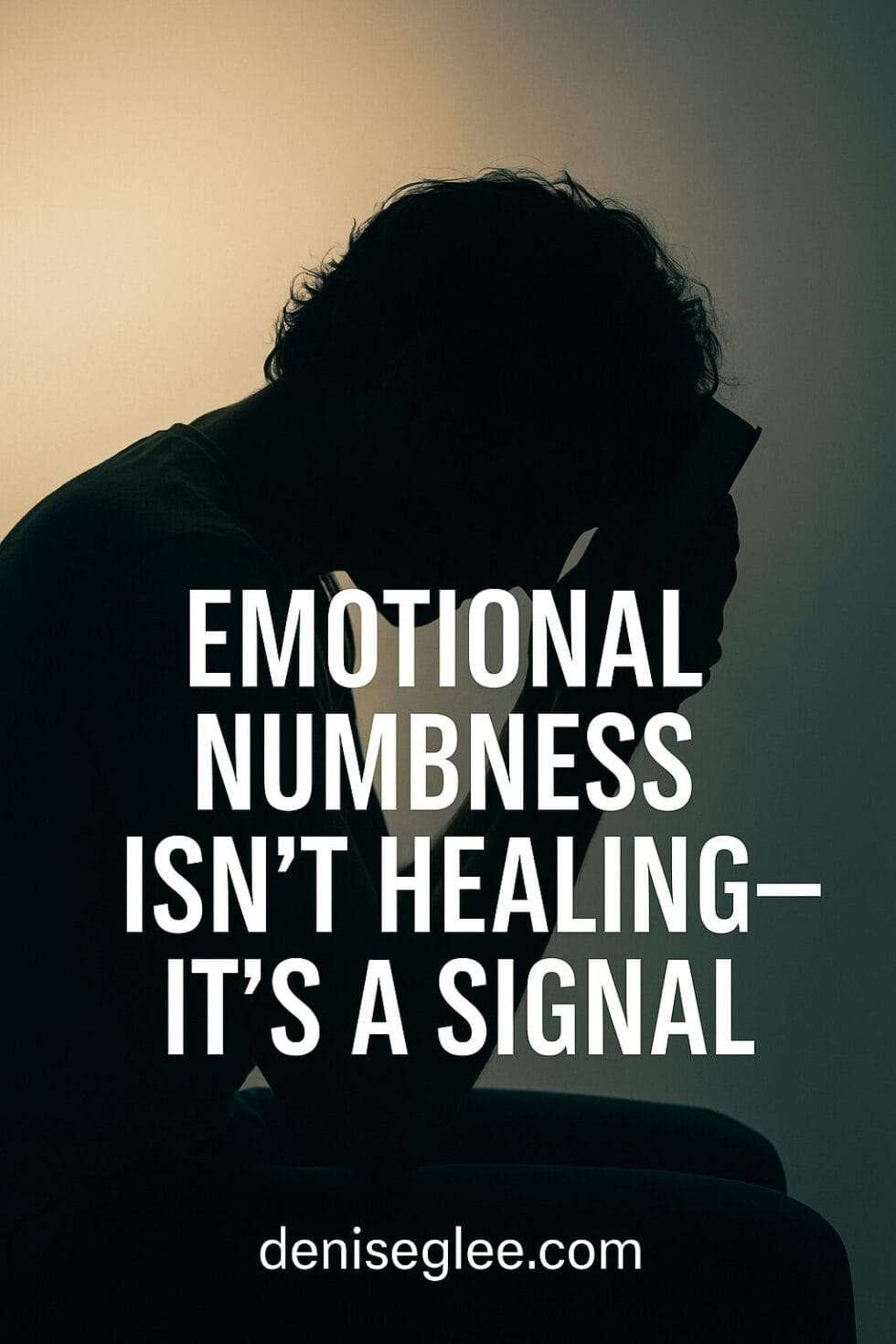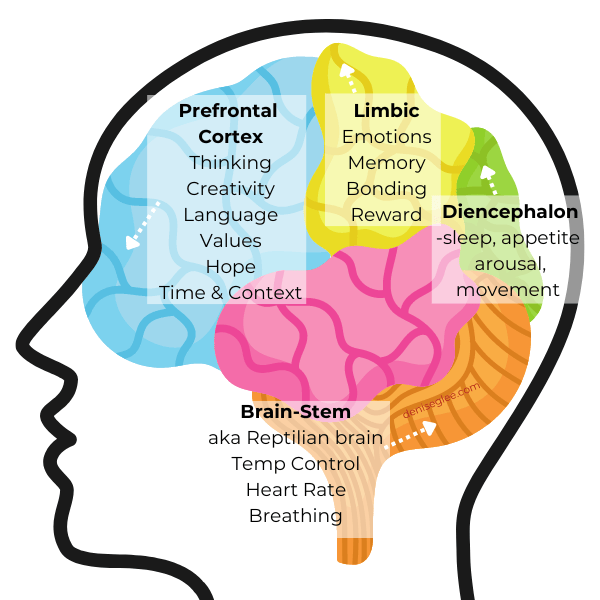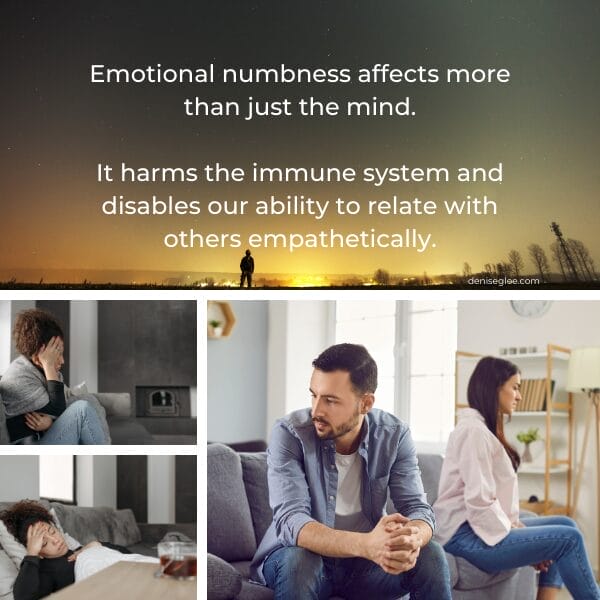
Emotional Numbness Isn’t Healing—It’s a Signal
- Updated: May 1, 2025
The Meeting I Don’t Remember
It was more than time.
I had notes in front of me. My camera was on. I was nodding at all the right moments.
And still—nothing.
No connection. No spark. Just this strange, weightless float between pretending and dissociating.
I couldn’t feel my voice.
I didn’t know what to say.
And the silence between responses felt like hours.
People were looking at me, waiting. Someone asked me a direct question. I think I answered it. I must have.
But inside, I was somewhere else entirely.
Not distracted—disconnected.

That’s what emotional numbness does. It strips you of presence and then tells you to perform anyway.
You smile. You check the boxes.
But no one—not even you—gets the real version of you.
If you’ve ever sat in a meeting and felt like a ghost…
If you’ve ever stared at your screen and wondered why you feel nothing, even when everything’s “fine”…
This post is for you.
I’m going to tell you the truth about emotional numbness—what it is, why we do it, how it wrecks your work and your life, and what healing actually looks like when you’ve been gone for a while.
🌿 What We’ll Explore Together
🧊 What Emotional Numbness Is—and Why We Use It
Emotional numbness isn’t just “having a hard day.”
It’s the quiet shutdown that happens when your system decides feeling is too risky.
Never shedding a tear.
All calm. No rage.
You just… glide through.
You might look calm on the outside.
But inside? You’re gone.
For years, I told myself I was just being efficient.
Just focused.
Just not in the mood to deal with drama.
But the truth was: I had trained myself to not feel—because I didn’t trust what might come out if I did.

🔒 Why Numbness Happens (and Why It Works… at First)
If you grew up in a chaotic or emotionally unsafe home, your brain did what it had to do:
It built a wall.
Numbing is your body’s way of protecting you from the emotional noise and danger of growing up around people who couldn’t regulate their own pain.
It’s like your brain hit the dimmer switch on your feelings so you wouldn’t burn out—or break.
In the moment, that shutdown feels helpful. It keeps you steady when things are falling apart.
But over time, the cost becomes clear. This is where you:
-
Stop knowing how you really feel.
-
Get good at performance but bad at presence.
-
Lose access to joy—not just pain.
-
Move through your life like a ghost in your own story.
When you suppress, deny, evade, or avoid painful feelings, in the process, you are damaging all of your brain parts because you're trying to force your prefrontal cortex to deny reality.
Denise G Lee Tweet
🧠 A Quick Look at What’s Happening in Your Brain
Here’s a simplified view of how your brain is wired to protect you:

Prefrontal Cortex – thinking, creativity, time awareness
Limbic System – emotions, memory, connection
Diencephalon – regulation of sleep, hunger, and arousal
Brainstem – survival basics like heart rate and breathing
When you experience long-term stress or emotional trauma, your brain prioritizes the brainstem and diencephalon—basic survival—at the expense of emotional processing (limbic) and critical reflection (prefrontal cortex).
You go into autopilot.
Your body keeps the lights on—but the part of you that feels, hopes, and imagines dims down.
🌫️ When You Leave Without Leaving: What Dissociation Really Is
Before we talk about the signs of checking out, we need to name what’s often underneath it: dissociation.
Dissociation is what happens when your body stays in the room—but you don’t.
It’s not always dramatic.
Sometimes, it’s just a soft mental fade. A moment where time blurs.
You were there… but not really.

You might experience it as:
Driving somewhere and not remembering how you got there
Hearing someone speak and realizing you didn’t absorb a word
Feeling like you’re watching yourself from far away
Forgetting big chunks of conversation, even in emotionally important moments
Feeling like your body doesn’t fully belong to you
Dissociation is not a defect. It’s your brain’s emergency override switch.
It kicks in when emotions feel too big to process or too dangerous to feel.
Over time, though, dissociation becomes more than a moment—it becomes a mode.
And that mode can keep you from building intimacy, showing up in your business, and even feeling your own accomplishments.
The next section will help you recognize how dissociation and emotional numbness may already be shaping your day-to-day life—often without you realizing it.
🚨 Signs You’re Checking Out (at Work and Beyond)
Emotional numbness doesn’t always look like silence.
Sometimes it shows up as overfunctioning, overexerting, or quietly imploding in private while keeping it together in public.

Behind Closed Doors: Amanda’s Story (name changed)
Amanda looked like she had it all together—three kids, a thriving business, a marriage that seemed stable.
But under the surface, she was melting.
She didn’t scream for help. She didn’t collapse in public.
She coped the only way she knew how: by cutting herself in places no one could see.
No one noticed. Not until her daughter, Sammy, asked:
“Mommy… is it normal to have so many bruises around your scars as an adult?”
Amanda didn’t answer. She ran to the closet, shut the door, and cried.
Because in that moment, the armor cracked.
This is what emotional numbness does—it detaches you so thoroughly that pain feels easier to manage than vulnerability.
And Amanda’s story is not rare.
❄️ Signs of Emotional Numbness That Are Easy to Miss or Justify

Here are ways emotional disconnection can masquerade as “normal”:
Zoning out in meetings but still nodding and taking notes
Feeling blank during joyful or painful moments—holidays, milestones, even loss
Only able to label emotions as “tired,” “overwhelmed,” or “fine”
Watching shows, scrolling endlessly, or listening to podcasts—but never really absorbing them
Saying “I’m just not emotional” when asked about deeper feelings
Flinching from emotional closeness or pulling away when people get too warm
Suddenly overeating, overexercising, or skipping meals and calling it discipline
Seeking adrenaline through high-risk sports, workaholism, or chaotic relationships
Getting tattoos over bony areas—like ribs, ankles, spine—not for expression, but for the pain
Using substances or sexual chaos to “feel something real”
These aren’t personality quirks.
They’re symptoms of a system trying to survive something it wasn’t equipped to name.
Numbness isn’t always quiet. Sometimes it’s covered in ink, adrenaline, or achievement.
And underneath it all is someone trying to come back to life without falling apart in the process.
In the next section, we’ll talk about what healing looks like when you’re finally ready to feel again—and what to do when you’re not sure how to begin.

🛠️ Healing: Coming Back to Life in Layers
If you’ve been emotionally numb for a long time, “healing” might sound vague or far away.
But it doesn’t start with fireworks. It starts with noticing.
Noticing when you feel disconnected.
You are know aware when you want to avoid emotions.
Now not ignoring when you’re flat but pretending to care.
Healing from emotional numbness isn’t about forcing yourself to feel everything at once—it’s about learning how to feel safely, gradually, and truthfully again.
Here are some of the most powerful ways to begin that return:

🧠 Therapy and Trauma-Informed Support
Talking with someone trained in trauma isn’t just about “processing the past.” It’s about helping your nervous system feel safe enough to show up again. A skilled therapist can help you unpack why you numb out and offer tools to slowly reconnect.
🌬️ Mindfulness + Grounding Techniques
Breathing exercises.
Sitting with your hand on your chest.
Naming what you see, hear, smell, or feel.
These aren’t trendy self-care tricks—they’re how you signal to your body, “Hey, we’re safe now. We can stay.”
🎨 Expressive Outlets (When Words Aren’t Enough)
Sometimes, you don’t need to explain your pain—you need to move it.
That’s where music, dance, drawing, or movement come in. They help you access emotions you’ve buried or never named.
📓 Journaling to Reclaim Time
Emotional numbness often distorts time—days blur, years disappear. Writing even a few lines a day about what happened and how it felt helps you stitch your sense of self and memory back together.
💛 Self-Reflection + Self-Compassion
The truth is, your numbness wasn’t weakness.
It was brilliance—your body doing what it had to do to survive.
Now, as you reflect, ask yourself:
Is my personality really me… or a long-practiced trauma script?
🧱 Boundaries That Rebuild Safety
If you were never taught that your emotions or body mattered, boundaries might feel selfish. But they’re not.
They’re how you relearn safety—by saying, “This is where I stop and someone else begins.”
👥 Real, Supportive Community
Find people who won’t rush your healing, who understand what it means to disappear inside and still show up outside.
Whether it’s a support group, a close friend, or a quiet online space—connection is medicine.
🏃🏾♀️ Physical Exercise or Massage
Trauma lives in the body.
And when you start to move—walk, stretch, lift, dance—you don’t just build strength. You rebuild relationship.
Giving yourself permission to engage with your breath.
Embracing your senses without flinching.
Finally, learning to yourself.
📚 Learn What Your Body’s Been Doing to Protect You
The more you understand how emotional shutdown works, the less shame you’ll carry.
You can start here on my blog—or pick up a book that helps you feel less broken and more informed.
Healing isn’t linear.
It’s not clean.
But it’s possible.
Even if you’ve been numb for years, you can learn how to feel again—without drowning in it.
🌿 Final Thoughts
If you’ve been numb, checked out, or living half-present for a long time…
this post might have stirred something in you.
Maybe discomfort.
Maybe grief.
Maybe just the quiet ache of recognition.
That’s okay.
You’re not behind or behind.
You’re just waking up to what your body’s been carrying—and what it’s been trying to protect you from.
Coming back to life after emotional numbness isn’t dramatic.
It’s subtle and slow.
It’s deciding to stay with yourself a little longer today than you did yesterday.
You’re allowed to take your time.
And yes, it doesn’t matter if you do not have words yet.
Now is the time to finally heal without putting on a show.
And if you want a guide through that process—I’m here.
💛 Work with me, Denise G. Lee – If you’re ready to feel again—on your terms, with safety, clarity, and no performance—I’d be honored to support you.
👉 Explore coaching options
🎧 Want more gentle guidance?
Tune into my podcast where I unpack emotional healing, leadership, and the quiet work of becoming whole.
👉 Introverted Entrepreneur Podcast
💌 Have something on your heart after reading this?
Send me a message—I’d love to hear from you.
👉 Write me a note
You’re not supposed to be perfect.
You’re just supposed to come home to yourself.





